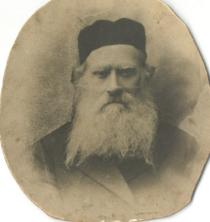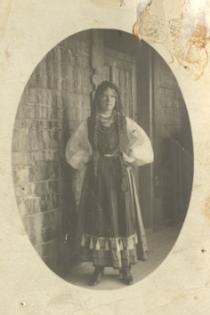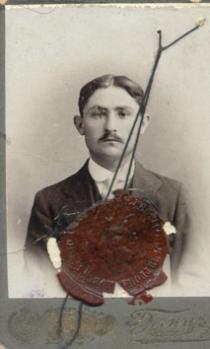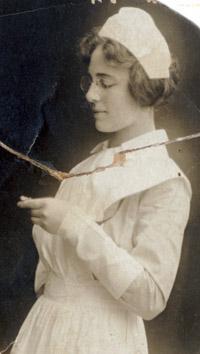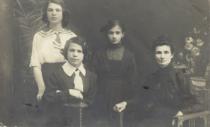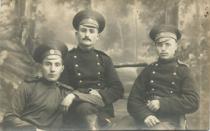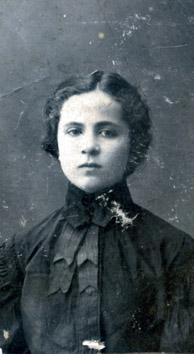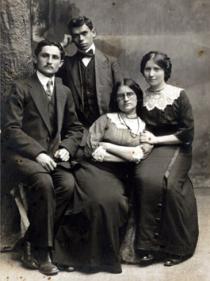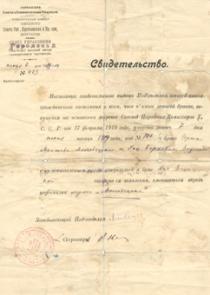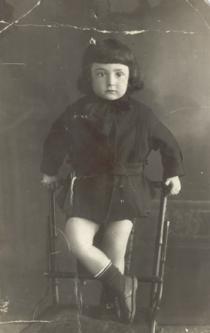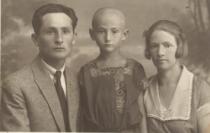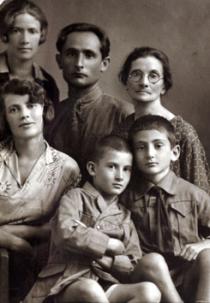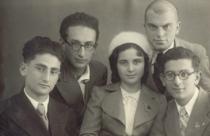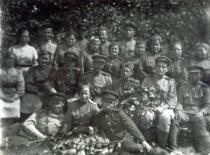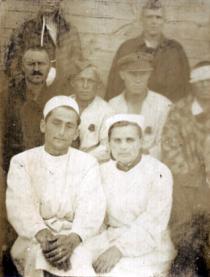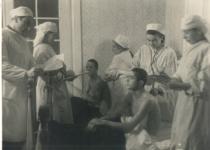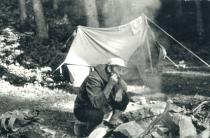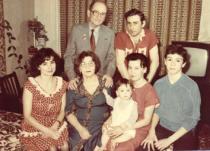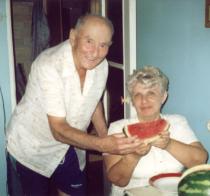This is me, Boris Molodetski (second from left sitting), with the military hospital personnel. This photo was taken in Sarny Rovno region in 1944.
During World War II I and my mother evacuated to Alma-Ata (Kazakhstan). evacuation In Alma-Ata I went on my education in the Kazakh Medical College. On 3 July 1943 I received my diploma with honors and became a certified therapist. On the following day we received subpoenas to the military office.
We arrived at the front in Nezhin on 6 November 1943. We were following advancing troops to the West. Our hospital was near the railway station in Sarny, Rovno region. The station was continuously bombed and we moved to Tutovichi station in 8 km from Sarny. We lived in earth huts that our patients helped us to dig. In one earth hut women were accommodated and men in another. There were two couples living in a civil marriage: they had two small separate earth huts made for them. We built a barrack with a diner and a storeroom and also we made a club in a tent spread on two posts. There were swarms of mosquitoes exhausting us. They hummed exactly like German Heinkel aircraft. We set green spruce cones on fire in tins from American tinned meat: it generated acrid thick smoke. We installed it in the dwelling and when the smoke filled it one of us keeping his breath ran inside and grabbed the tin to take it outside. We hanged a gauze curtain on the door. This helped us to get rid of mosquitoes.
Attendants in the hospital washed bandages, but they took the rest of laundry to special laundry units. Many patients had fleas. I managed to escape this by changing my underwear every day. This was rough cheap cotton underwear and when you moved your shoulders it felt like a bast whisp brush. We often washed in the sanitary washroom. There were huge 500 L tubs connected to a boiler. Patients and hospital employees had meals in the dining room. We had good food. There was always a nice piece of meat in borsch or soup. This was our base food. We received uniforms in the storeroom. We chose a bigger size overcoat to have it altered by a tailor when we lodged in a town. Some women even managed to have puffed sleeves made in their coats. There was a shoemaker among our patients. He could make nice boots from a pair of hospital slippers and ground sheet. They were light and nice, although they were khaki color that was against the rules. We applied black shoe polish and managed to polish them to glitter and they looked as the best boxcalf boots.
I was elected Komsomol leader of the hospital. My attendance of all party meetings was compulsory. There was a staff propagandist in our hospital. He read us newspapers in our political training classes in the morning. He also watched that girls behaved decently. He checked them peeping into their windows in the evening. There was one Smersh [special secret military unit for elimination of spies, under the slogan 'Death to spies'] officer per 2-3 hospitals. Once I had to address one. A train with the wounded arrived at our hospital. Every patient had records of his wounds. Some wounded had a package. This meant that they had had surgeries. I noticed that one patient with a wound in his right hand behaved differently turning away from everybody. I approached him and opened his package. There was a paper with 'verdict of the military field court' in it. It turned out to be a self-inflicted wound. I was bound to find a Smersh officer to notify him. He thanked me, took this patient on a truck and they left.
At the end of the war our hospital was in Straussburg town 28 km from Berlin. On 2 May 1945 chief of hospital put us on a truck and we went sightseeing to Berlin. We signed on the Reichstag. We were told to not come inside houses. There were many mined things in them. On 9 May we got to know that Germans signed capitulation and by two o'clock in the morning we began to receive patients again. It turned out they saluted from different weapons without looking where they were shooting and wounded many people.

